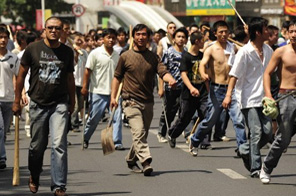Mobs on the prowl in Urumqi
URUMQI: Mobs wielding makeshift weapons roamed this restive city Wednesday, with vigilantes pummelling two Uighur Muslims, but a massive show of force by Chinese troops brought some calm.
President Hu Jintao abandoned a Group of Eight summit in Italy in what observers said was an unprecedented move, to tackle one of China's worst spikes in ethnic tensions in decades.
In Urumqi, the capital of the remote northwest Xinjiang region where 156 people died in unrest on Sunday, army helicopters circled overhead as thousands of soldiers and riot police filled the city shouting out "protect the people".
"We support this," said a 45-year-old Han Chinese as he watched the troops roll by in trucks.
"But they should have got here sooner. It took them three days to do this. Why so long?" After authorities blamed Muslim Uighurs for Sunday's unrest that also left more than 1,000 people injured, Han Chinese took to the streets Tuesday with shovels, meat cleavers and other makeshift weapons vowing to defend themselves.
The city descended into chaos as mobs, sometimes made up of thousands of Han, surged towards Uighur neighbourhoods, only to be pushed back by security forces who fired volleys of tear gas.
After a night-time curfew was declared on Tuesday, Chinese authorities appeared determined to show they were able to maintain order.
Thousands of riot police wearing helmets and carrying shields lined up on a main road in Urumqi dividing the city centre from a Uighur district, with columns of soldiers behind them.
But many Han Chinese and some Uighurs still carried makeshift weapons in the city centre and outlying districts, leading to confrontations and violence, according to AFP reporters.
In one of two attacks witnessed by AFP reporters, about 20 Han Chinese men armed with wooden bats attacked a Uighur man in central Urumqi.
The beating stopped after about one minute when security forces moved in to disperse the mob, the AFP reporter said, while a local Han Chinese woman said the victim was a Uighur man.
The extent of the man's injuries was unclear, as he was quickly taken away.
In the second incident, a group of Han Chinese saw three Uighurs at an intersection and chased them.
Two of the Uighurs were able to get away, but a third was caught by some of the crowd and attacked as the mob yelled "strike, strike, strike".
The victim was kicked and beaten for around 30 seconds by both men and women, before police took him away. AFP reporters said he had blood on his face after the beating.
In another incident, about 200 Uighurs armed with sticks, pipes and rocks began protesting directly in front of a police cordon that was dividing their neighbourhood from a Han-populated area, one AFP reporter said.
A smaller group of Uighurs had been trading insults and accusations with Han who were on the other side of the cordon and similarly armed with makeshift weapons.
The crowd of Uighurs grew after a helicopter dropped leaflets blaming Sunday's unrest on exiled Uighur leader Rebiya Kadeer, but they also claimed police had overnight allowed Han Chinese to freely attack Muslim areas.
Police moved foreign reporters away from the scene after about 15 minutes, stopping them from being able to witness the stand-off any longer.
Highlighting the severity of the crisis, the government announced Hu had cut short his trip to Italy for the G8 summit.
"I have never seen a Chinese president shorten a trip abroad before... there is clear concern," said Jean-Pierre Cabestan, professor of political science at Hong Kong Baptist University.
"It shows that no important decisions can be taken without him -- he is the only link between civil and military power." Xinjiang's eight million Uighurs make up nearly half the population of the region, a vast area of deserts and mountains rich in natural resources that borders Central Asia.
The Turkic-speaking people have long complained of repression and discrimination under Chinese rule, but Beijing insists it has brought economic prosperity to the region.






